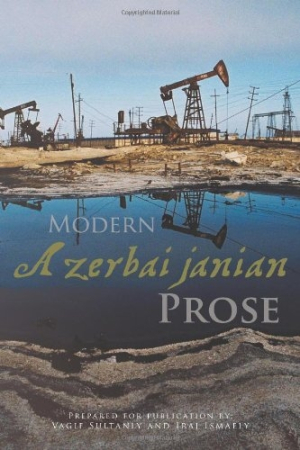Modern Azerbaijanian Prose
“What is really best in any book is translatable—any real insight or broad human sentiment,” said Ralph Waldo Emerson, nineteenth-century American writer. Readers seeking such insights will find Modern Azerbaijanian Prose, compiled by Vagif Sultanly and Iraj Ismaely, a valuable read. It includes short stories and novellas by thirty authors, with tales ranging from memoir to fable, from sobering to fanciful. The collection contains author biographies and photos, as well as an introduction summarizing contemporary Azerbaijani history, culture, and prose. Given this nation’s difficult history, many of the selections focus on government oppression, evil padishahs (rulers), famine, and fear. But islands of sweetness and tenderness pierce this otherwise dark sea.
Vagif Sultanly is professor of modern Azerbaijani literature at Baku State University and author of several scholarly articles. He has edited three academic journals, including The World Azerbaijanis. Biographical information on Iraj Ismaely cannot be found.
Fulbright scholar Alison Mandaville notes that Azerbaijan’s literature, “once the pride of the region,” hit its one-thousand-year nadir in the aftermath of the country’s independence from the USSR in 1991, when government censorship was rampant and the publishing industry collapsed. Sultanly and Ismaely, therefore, have accomplished a vital undertaking in bringing Modern Azerbaijanian Prose to the world’s attention.
The variety of story types is both impressive and refreshing, and the details of Azerbaijani landscape and life give readers the opportunity to know this complex land and its stalwart people. Chingiz Huseynov’s poignant memorial to his mother, for example, includes snippets of memories that arouse all the senses: “Wherever you looked, there were countless derricks smelling of oil—a smell that has permeated my life since childhood; it is the smell of my native city, the sea, and everything dear to me,” (hence the book’s cover photo) and “The men were dancing … Their brown waist and shoulder belts creaked; their riding breeches protruded from their polished high boots that shone like lacquer on dark wood.”
Azerbaijan is a male-dominated culture, so it is not shocking that only one of the thirty authors represented in this compendium is female; but it certainly is disappointing. Including more women authors could have made the volume truly modern.
With nearly two dozen translators, the quality of translation varies widely. Some translations (by Firudin Agazade, Aytan Aliyera, Anjura Huseynova, and Holly Smith, for example) are so good that readers may think the original stories were written in English. In other cases, however, the translations are so literal they destroy the flow of the narrative arc and, more importantly, the story’s power. Amir Pahlavan’s account of a man whose father is lynched and whose mother commits suicide is a chilling tale of oppression, but the weak translation destroys the strength and artistry of the tale. This translation includes, for example, the statements that “My dad was hung up” (not “hanged”), that the executioner “dropped the rope through his head,” and that the protagonist “took out” a little bird’s “hair, put her on woods, fired, and then ate.” Similarly, Akram Aylisli’s tale of a man felling an ancient walnut tree is marred by unsophisticated translation: “He shut the door on the face of teacher Nasir he had opened and walked in.” Typographical errors also are common throughout the collection.
But these errors are only distractions. Readers of Modern Azerbaijanian Prose should look beyond awkward translation, seeking instead Emerson’s “real insight or broad human sentiment” in these stories of a rich and varied land on the shores of the Caspian Sea. In so doing, they will be rewarded.
Reviewed by
Nancy Walker
Disclosure: This article is not an endorsement, but a review. The publisher of this book provided free copies of the book and paid a small fee to have their book reviewed by a professional reviewer. Foreword Reviews and Clarion Reviews make no guarantee that the publisher will receive a positive review. Foreword Magazine, Inc. is disclosing this in accordance with the Federal Trade Commission’s 16 CFR, Part 255.

